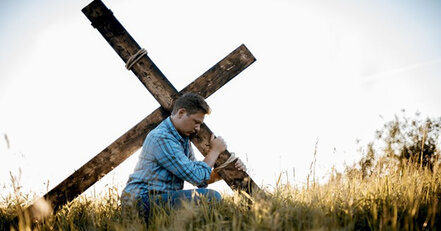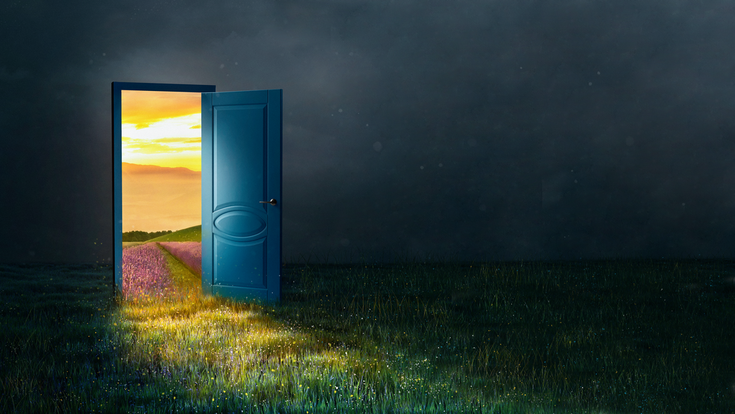
First Congregational Church of Cheshire
© the Rev. Dr. James Campbell
Mark 8:31-38
Then he began to teach them that the Son of Man must undergo great suffering, and be rejected by the elders, the chief priests, and the scribes, and be killed, and after three days rise again. He said all this quite openly. And Peter took him aside and began to rebuke him. But turning and looking at his disciples, he rebuked Peter and said, “Get behind me, Satan! For you are setting your mind not on divine things but on human things.”
He called the crowd with his disciples, and said to them, “If any want to become my followers, let them deny themselves and take up their cross and follow me. For those who want to save their life will lose it, and those who lose their life for my sake, and for the sake of the gospel, will save it. For what will it profit them to gain the whole world and forfeit their life? Indeed, what can they give in return for their life? Those who are ashamed of me and of my words in this adulterous and sinful generation, of them the Son of Man will also be ashamed when he comes in the glory of his Father with the holy angels.”
Mild dyslexia made it difficult for me to learn to read music as a child. But my ear was good and I picked up melodies quickly. And so, to encourage this, my grandmother bought me a toy grand piano. I loved it and would spend hours sitting on the floor of my bedroom, pecking out melodies, and driving everyone else crazy.
I clearly remember the first song I ever learned to play all the way to the end. It was not “Twinkle, Twinkle, Little Star” or “Mary Had a Little Lamb.” It was a 19th century Gospel hymn entitled: “Nothing but the Blood of Jesus.” And the lyrics are like this: “What can wash away my sins? Nothing but the blood of Jesus. What can make me whole again? Nothing but the blood of Jesus. Oh, precious is that flow that makes me white as snow. No other fount I know. Nothing but the blood of Jesus.”[1]
I looked for that song in our hymnal this week, but it was not there. Songs like that are out-of-fashion for folks like us. “A Gospel of gore” some people call it. Such quid-pro-quo theology no longer represents how most of us think about the atonement; that is, what the cross means and how what Jesus did on the cross saves us.
The cross, in general, is a difficult subject to broach because of its blood and suffering and pain and death. The whole thing frightens us. And rightly so. And maybe it frightened Peter too. Maybe that’s why Peter pulled Jesus aside and tried to talk some sense into him. “Stop being so gloomy, Jesus. You’re bringing everybody down. No one wants to talk about suffering and death. Let’s be positive! Let’s talk about kicking the Romans to the curb. That will excite people. That’s how we will build a movement!”
The Gospel writer says that before Jesus responded to this public scolding by Peter, he turned and looked at his other disciples, who were watching all of this with rapt attention. It was a perfect teaching moment. Then Jesus, who loved Peter, replied with these rather shocking words: “Get behind me, Satan. You have your mind set on human things and not divine things.” And then Jesus further explained what those divine things were. He said, “If you want to follow me and really change the world, you have to lose what you call life in order to find true life. And in order to find true life - you have to pick up your cross and follow me.”
Notice that in this passage, Jesus makes no reference to his own cross. Instead he focuses on theircrosses; our crosses. And that’s interesting to me since in the church, we so often focus exclusively on the cross of Christ and what it does for us? But in this moment, at least, Jesus focused on our crosses and what they do for others.
A cross for you and a cross for me - frankly, I’d rather talk about the cross of Jesus. I’d rather gaze lovingly at the cross on the wall behind me. I’d rather wear one around my neck. I much prefer a passive interaction with the cross, one that doesn’t really cost me anything, but instead gives me everything.
And isn’t that the kind of faith that most churches are selling? It’s all about what you can get by coming to our church. It’s all about the menu options of programs that we can provide to you and your family; a boutique experience of the religious life! Lots of perks and no pain.
But is that what Jesus was talking about in this passage? Is that the dream that Jesus had for the world, when he went about feeding the hungry and healing the sick and welcoming the marginalized and speaking for the voiceless and standing up to the powers that grind people down? Is that the dream that Jesus had for the world when he taught us to pray: “Thy Kingdom come on earth as it is in heaven?”
Now wait a minute, you might be thinking. Isn’t First Church involved in a growth program and strategic thinking about our future? Aren’t we always looking for more options that will enrich the lives of our parishioners? Don’t we want a strong and thriving institution with lots of members and engaging programs and a strong financial base?
Well, I do! And there isn’t anything wrong with that, as long as we remember why we do it all. As long as the cross is in the center of it all – Jesus’s and ours.
Dietrich Bonhoeffer was a German pastor and prominent theologian during the Third Reich. While most of the German church capitulated to Hitler, trading the promises of Christian nationalism for their souls, Bonhoeffer and others resisted. They continued to preach a life of sacrifice and humble service to the least of these. And that resistance cost Dr. Bonhoeffer a great deal. In the waning days of the war, the Nazi executed him.
Bonhoeffer wrote a famous book about what it means to follow Jesus. It is still in print and is entitled: The Cost of Discipleship. In it, he diagnosed what he saw as the great problem of the church, writing that what most Christians want is what we he called “cheap grace.” And this is how he defined it: “Cheap grace is the grace we bestow on ourselves. Cheap grace is the preaching of forgiveness without requiring repentance, baptism without church discipline, Communion without confession.... Cheap grace is grace without discipleship, grace without the cross…” [2]
In San Francisco’s Tenderloin, there is a well-known church called Glide Memorial. It was founded in 1930 and funded by a very rich Methodist lay woman named Lizzie Glide. And it certainly enjoyed its heyday, with a large congregation and lots of programs. But by the early 1960s, the neighborhood had changed. And the needs of the neighbors had changed. And the church was a shadow of its former glorious self.
In 1963, a new minister, the Rev. Cecil Williams, was called to the pulpit. And Rev. Williams was not your ordinary pastor. He was fiery and unorthodox. And more than anything, he believed that the Gospel of Jesus ought to actually change people’s everyday lives. Under his leadership, the church instituted a great variety of innovative social programs to meet the needs of their neighbors. The congregation poured their resources and their time and their energy into providing food and shelter and medical care and job training and drug and alcohol rehabilitation to the addicts and prostitutes and gay runaways who now populated the pews.
Now, this was a lot for some of the more established members to take, and they left the church. But it was what Williams did in 1967 that really shook the foundations. He very controversially ordered that the cross in the sanctuary be removed, and justified this action by telling his congregation, “We must all be the cross.”
Well, that’s likely not something I would have done. But I can’t argue with its theology. Because if it is the cross that saves people, then that is exactly what happened at Glide Memorial Church. The congregation literally saved lives because they decided that crosses don’t just belong on walls. They belong on our shoulders, as we follow Jesus into the world that he died to save.
[1] Lyrics and Music by Robert Lowry
[2] "Devotional Classics" edited by Richard J. Foster & James B. Smith; "The Cost of Discipleship" by Dietrich Bonhoeffer.



 RSS Feed
RSS Feed